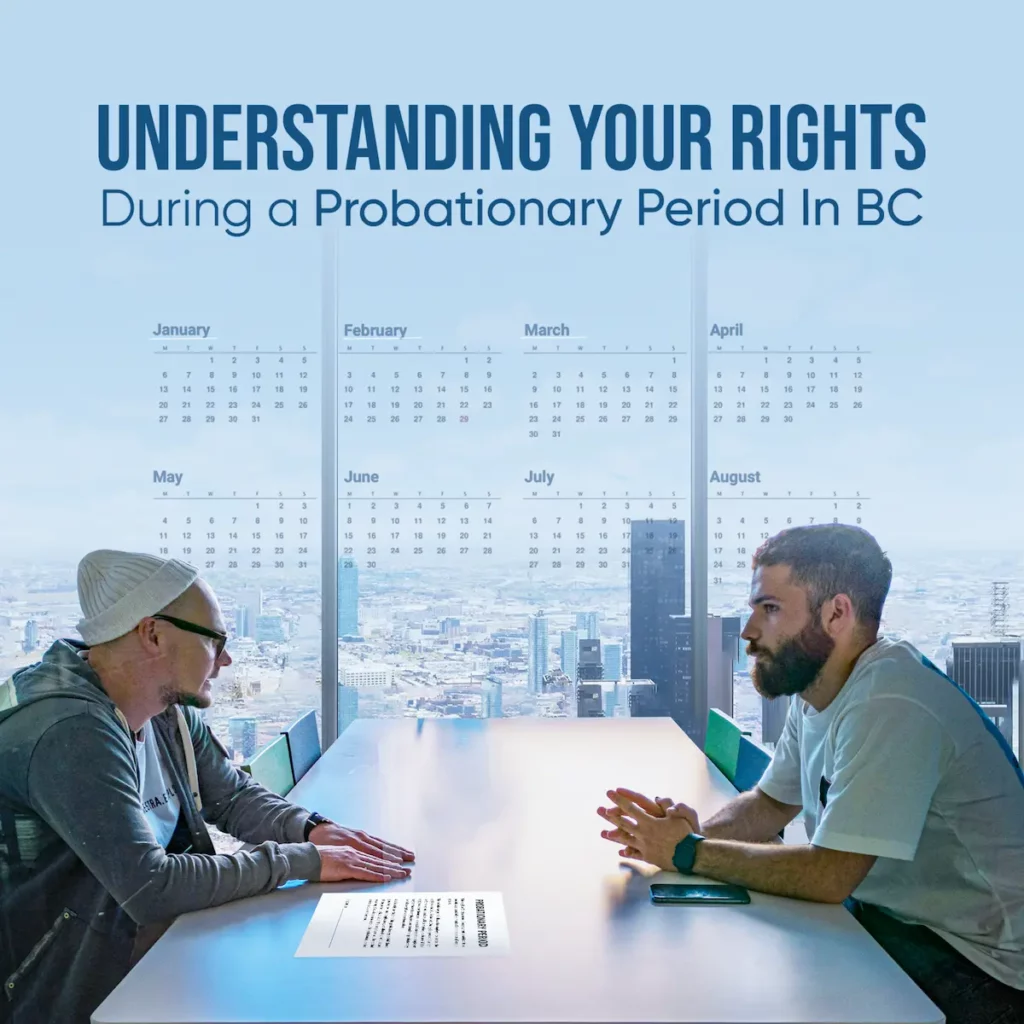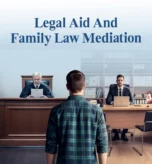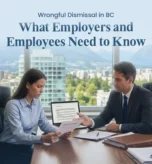Starting a new job can be a mix of excitement and uncertainty for employees, especially during the probationary period. For British Columbia workers, understanding what your rights are during this phase is essential to ensure fair treatment and compliance with employment law.
This blog will explore probationary period rights in BC, including legal rights for employees, employer obligations, and what happens after the period ends. Whether you’re a new hire or an employer, this guide will set the record straight on probationary period rights in BC.
What is a Probationary Period in BC Employment Law?
A probationary period is a set timeframe during which the employer assesses a new employee’s suitability for a role. This period is common in employment contracts across British Columbia and serves as a critical evaluation window for performance, and to see if the employee is a good fit within the company culture and can adhere to workplace policies.
Typical Duration of a Probationary Period
Probationary periods in BC typically last three months (90 days).
Some employment contracts may outline a longer period, but extending beyond the initial three months comes with legal requirements, including providing notice or severance pay for termination.
Purpose of the Probationary Period
Employers utilize the probationary period to gauge the employee’s capabilities and alignment with the company’s expectations, while employees have the opportunity to evaluate whether the role meets their needs. However, both parties must adhere to legal boundaries during this period, which we’ll detail further below.
Legal Rights During a Probationary Period
Contrary to popular belief, probationary employees are not without rights in BC. Here are key protections you should know about as a new hire in this phase.
1. Wages and Work Conditions
Employees are entitled to fair wages as promised in their employment agreement. The probationary status does not excuse the employer from BC’s Employment Standards Act (ESA), ensuring compliance with minimum wage and regulated work hours.
2. Protection Against Discrimination
Even during a probationary period, employers must comply with the BC Human Rights Code, safeguarding employees against discrimination or harassment based on race, gender, religion, disability, or other protected categories.
3. Statutory Rights
The ESA still covers probationary employees for standard job protections. These include entitlements to statutory holidays, overtime pay, and safe working conditions.
4. Right to Notice for Termination After Three Months
If the probationary period extends beyond three months and your employment is terminated without cause, you are entitled to notice or severance pay under the ESA.
Termination During Probation: What Are Your Rights?
The probationary period often raises questions about termination, and it’s essential to understand your rights as an employee.
Dismissal Without Cause
During the first three months of employment, an employer in BC can terminate a probationary employee without cause or notice as long as this aligns with the employment contract and complies with applicable laws. However, discrimination on the grounds of violating the Human Rights Code is strictly prohibited.
After Three Months
Beyond the 90-day probationary window, termination laws become stricter. Employers must provide either notice or severance pay based on the employee’s length of service. This marks a turning point in enhanced worker protections.
Legal Review of Probationary Dismissals
BC courts require employers to demonstrate that they acted fairly and reasonably during the probation period, particularly if the termination is contested. If the employer fails to provide proper feedback or training during the probationary period, the termination could be deemed unjust.
Employer Obligations During the Probationary Period
Employers also have key responsibilities to meet during the probationary period to ensure fairness and compliance.
1. Providing Proper Training
Employers are required to offer adequate training and resources to help employees succeed in their roles. Dismissing an employee for underperformance without offering appropriate training could lead to disputes.
2. Offering Constructive Feedback
Throughout the probationary period, employers should provide regular feedback on performance and productivity. Employees must be given reasonable opportunities to improve where necessary.
3. Ensuring Safe and Fair Conditions
Employers must maintain workplaces free from discrimination, harassment, and unsafe conditions as outlined in both the ESA and the Human Rights Code.
4. Transparency in Expectations
Clear communication of job expectations and probationary targets is crucial. Ambiguity in expectations can lead to disputes if termination occurs.
What Happens After the Probationary Period Ends?
Once the probationary period concludes, employees in BC gain enhanced job security and legal protections.
Change in Rights
Employees are entitled to full notice or severance pay requirements in the event of termination.
Employers must have cause for dismissals or face potential legal challenges.
Transition to Permanent Status
After completing the probationary period, employees generally shift to permanent or long-term roles as outlined by the employment contract.
Depending on company policies, additional benefits, including health insurance or retirement plans, may become available.
Key Takeaway for Employees
Completing the probationary period is not just about proving your skills but also asserting your rights to fair treatment and legal protections moving forward.
Take Control of Your Rights
Navigating the probationary period can be daunting, but knowing your rights as an employee in BC ensures you’re prepared to advocate for yourself. Remember, fair treatment and adherence to the law are non-negotiable, even during this evaluation phase.
If you’re facing challenges with your employment rights or need further guidance, consider consulting a legal advisor specializing in BC employment law. Understanding the finer details of the probationary period rights, BC will empower you to make informed decisions.
In Conclusion
The probationary period is an opportunity for both employers and employees to assess a good fit and establish trust, but navigating your legal rights during this stage is equally crucial. If you’re unsure about your protections or obligations, professional legal advice can provide the clarity you need.
At Sorensen Truong LLP, we specialize in providing reliable legal solutions for individuals and businesses across British Columbia. Whether you need assistance understanding your rights during the probationary period or are facing employment disputes, our experienced team is here to help you move forward confidently.
Schedule a consultation today to ensure your workplace rights are always protected.





